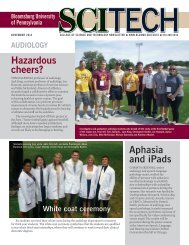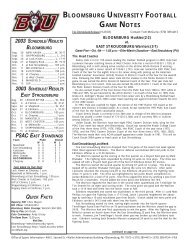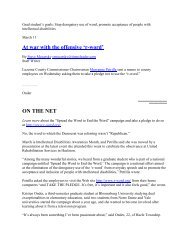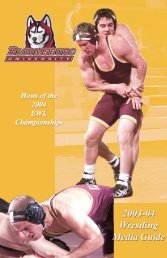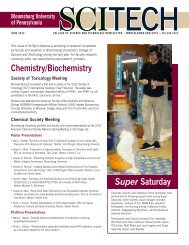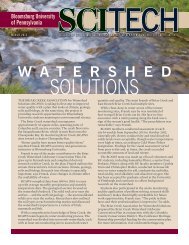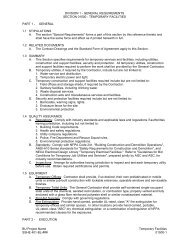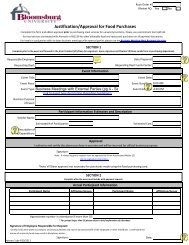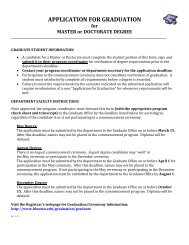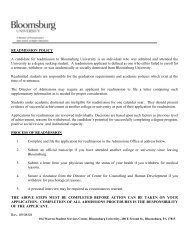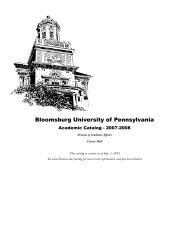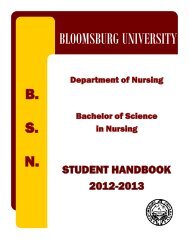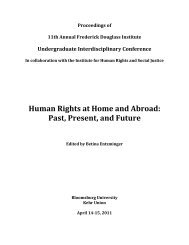RUNNING, PHILLY STYLE - Bloomsburg University
RUNNING, PHILLY STYLE - Bloomsburg University
RUNNING, PHILLY STYLE - Bloomsburg University
Create successful ePaper yourself
Turn your PDF publications into a flip-book with our unique Google optimized e-Paper software.
WHETHER IT’S A TELEPHONE,a<br />
television, a computer hooked to the<br />
Internet or even a huge radio telescope<br />
searching the heavens, the<br />
devices all have one thing in common.<br />
Somewhere, there’s a line or a cable<br />
that’s carrying all the information<br />
being collected or downloaded and<br />
sending it from one place to another.<br />
Figuring out ways to send evermore<br />
information over those lines<br />
faster and farther is where Vincent<br />
Urick comes in.<br />
Urick is a civilian scientist for the<br />
U.S. Naval Research Laboratory in<br />
Washington, D.C., where he manages<br />
a staff of five other researchers.<br />
Since its creation in 1923 at the urging<br />
of inventor Thomas Edison, the<br />
lab has focused on developing the<br />
technology needed to support the<br />
military, specifically research for the<br />
Navy and Marine Corps.<br />
Working on specially made, long<br />
stainless steel tables — called optical<br />
benches — Urick and his team string<br />
out spools of various fiber optic<br />
cables connected to lasers and other<br />
devices to see how best to carry<br />
information collected from antennas<br />
over long distances.<br />
Unlike the cable hooked up to a<br />
regular television that uses a digital<br />
signal, Urick’s experiments deal<br />
with analog signals which require<br />
higher-performance links. In 2004,<br />
for example, Urick and his team<br />
published results of research in<br />
which they were able to transmit<br />
1,000 times more information per<br />
second over a cable than the amount<br />
that flows through a regular cable<br />
television connection.<br />
“A lot of times, as we are advancing<br />
analog, we can start feeding into<br />
the next system of higher speed<br />
communications,’’ Urick says.<br />
“There is always the chance that<br />
through our research, we can further<br />
the standard telecommunications<br />
technology.’’<br />
From the start, Urick knew he<br />
was interested in science and mathematics,<br />
but his interests were skyward.<br />
At <strong>Bloomsburg</strong>, where he<br />
graduated magna cum laude in May<br />
2001 with a bachelor of science in<br />
physics, he thought his career path<br />
wouldbeinastrophysics.<br />
“I wanted to ponder why the universe<br />
is the way it is, the big picture,’’<br />
Urick says, recalling how impressed<br />
he was the first time he saw photos<br />
taken by the Hubble Space Telescope.<br />
Physics and astrophysics suited his<br />
analytical side, he says.<br />
Attending <strong>Bloomsburg</strong> was<br />
also a natural decision for Urick,<br />
who grew up in nearby Paxinos,<br />
Northumberland County. Family<br />
“I FEEL IF I CAN MAKE A DIFFERENCE<br />
FOR OUR COUNTRY’S DEFENSE, THAT’S<br />
WHAT I WANT TO BE DOING.’’<br />
members who have gone to<br />
<strong>Bloomsburg</strong> include his mother,<br />
Susanne, and sister Lisa McCarthy,<br />
who both earned master’s degrees in<br />
education.<br />
His career path took an unexpected<br />
turn when, as he was getting ready<br />
to graduate, he met another student<br />
who told him about opportunities<br />
with the U.S. Naval Research<br />
Laboratory. At that time, the country<br />
was in the midst of the dot-com<br />
technology bubble and private<br />
industry had hired away many of<br />
the laboratory’s scientists, whose<br />
government work with fiber optics<br />
and communications was in high<br />
demand as the Internet and related<br />
industries shifted into high gear.<br />
The pay was good, the work<br />
interesting and it gave Urick the<br />
chance to start doing research while<br />
holding only a bachelor’s degree and<br />
working toward his master’s and<br />
doctoral degrees from George<br />
Mason <strong>University</strong>. He met his wife,<br />
Cynthia, in graduate school a year<br />
after he started working at the lab.<br />
They married in 2004 and welcomed<br />
their first child, Elizabeth, in<br />
April 2009.<br />
Although he always liked the idea<br />
of working for his country, Urick<br />
says his feelings intensified after<br />
Sept. 11, 2001. From the lab, he could<br />
see the smoke billowing from the<br />
Pentagon the day of the attack.<br />
“It’s not that I’m any more or less<br />
patriotic after that day, but it kind of<br />
put things in perspective for me,’’<br />
Urick says. “I feel if I can make a difference<br />
for our country’s defense,<br />
that’s what I want to be doing.’’<br />
In 2007, Urick won the Navy Top<br />
Scientists and Engineers of the Year<br />
Award for his work on data transmission<br />
on fiber-optic systems,<br />
particularly its application to electromagnetic<br />
warfare and intelligencegathering.<br />
“It’s inspiring that he won the<br />
Navy award for a top scientist,’’ says<br />
Peter Stine, chair of BU’s physics<br />
department “When one of our alumni<br />
wins a big award like that, it<br />
inspires the students who are in the<br />
same program.’’<br />
Stine recalls Urick’s recent visit to<br />
the university to talk about his<br />
work. “Often students may not<br />
know exactly what career they want,<br />
and it’s important to see things in a<br />
variety of areas. With their differential<br />
equations and theories, undergraduates<br />
may not be able to see the<br />
light at the end of the tunnel.’’<br />
Gunther Lange, Urick’s faculty<br />
adviser who retired from BU last<br />
year, remembers his former student’s<br />
mix of ability and curiosity.<br />
“You have to have the curiosity and<br />
the skill set. Stay curious – that little<br />
statement says more about scientists<br />
than anything else,’’ he says.•<br />
Jack Sherzer is a professional<br />
writer and Pennsylvania native.<br />
He currently lives in Harrisburg.<br />
SPRING 2010<br />
17



